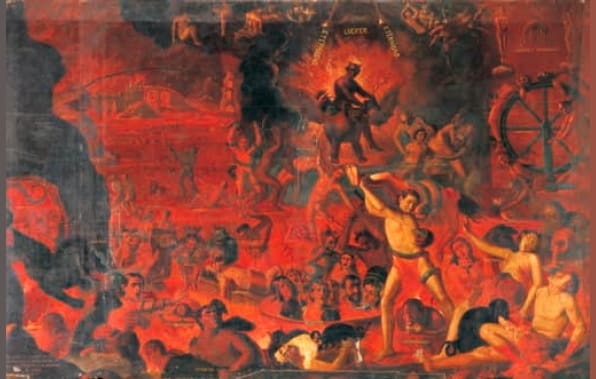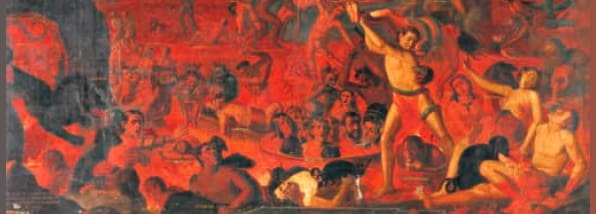ON THE ETERNITY OF HELL
“And these shall go into everlasting punishment.”
Matthew 25:46
Were hell not eternal, it should not be hell. Torments which continue but a short time, are not a severe punishment. The man who is afflicted with an imposthume [an abscess] or cancer, submits to the knife or the cautery. The pain is very sharp; but, because it is soon over, the torture is not very great. But, should the incision or cauterization last for a week, or for an entire month, how frightful should be the agony! A slight pain in the eye, or in the teeth, when it lasts for a long time, becomes insupportable. Even a comedy, a musical entertainment, should it continue for an entire day, produces intolerable tediousness. And should it last for a month, or for a year, who could bear it? What then must hell be, where the damned are compelled, not to listen to the same comedy or the same music, nor to submit merely to pains in the eyes or in the teeth, or to the torture of the knife, or of the red-hot iron, but to suffer all pains and all torments? And for how long? For all eternity, “They shall be tortured forever and ever” (Revelation 20:10).
 This eternity is of faith; it is not an opinion, but a truth attested by God in so many places in the Holy Scriptures. “Depart from me, you accursed, into everlasting fire” (Matthew 25:41). “And these shall go into everlasting punishment” (Matthew 25:46). “Who shall suffer eternal punishment in destruction” (cf 2 Thessalonians 1:9). “Everyone shall be salted with fire” (Mark 9:49). As salt prevents putrefication, so the fire of hell, while it tortures the damned, performs the office of salt by preserving their life. “Ignis ibi consumit,” says St. Bernard, “ut semper servet” (Medit., ciii).
This eternity is of faith; it is not an opinion, but a truth attested by God in so many places in the Holy Scriptures. “Depart from me, you accursed, into everlasting fire” (Matthew 25:41). “And these shall go into everlasting punishment” (Matthew 25:46). “Who shall suffer eternal punishment in destruction” (cf 2 Thessalonians 1:9). “Everyone shall be salted with fire” (Mark 9:49). As salt prevents putrefication, so the fire of hell, while it tortures the damned, performs the office of salt by preserving their life. “Ignis ibi consumit,” says St. Bernard, “ut semper servet” (Medit., ciii).
Now, how great should be the folly of the man who, for the sake of a day’s amusement, would voluntarily condemn himself to be shut up in a dungeon for twenty or thirty years! If he lasted but a hundred, or even but two or three years, it would be the extreme of folly in a Christian to condemn himself to fire for two or three years for the evil pleasure of a moment. But there is not a question of thirty, of a hundred, of a thousand, or of a hundred thousand years; but there is a question of eternity; there is question of suffering forever the same torments–torments which shall never end, and shall never be mitigated in the slightest degree. The saints, then, had reason, as long as they were on this earth, and in danger of being lost, to weep and tremble. Blessed Isaiah, even while he lived in the desert in fasting and penitential rigors, wept, and said, “Ah, unhappy me, who am not as yet free from the danger of losing my soul.”
Affections and Prayers
Ah, my God, if thou hadst sent me to hell, as I have often deserved, and hadst afterwards drawn me from it, how deeply should I feel my obligations to thee! What a holy life would I have commenced! And now that thou hast shown me mercy by preserving me from falling into that place of woe, what shall I do? Will I again offend thee and provoke thy wrath, that thou mayst send me to burn in that prison of rebels against thy majesty, where so many are buried in fire for fewer sins than I have committed? Ah, my Redeemer! I have hitherto done so; and in stead of availing myself of the time which thou gavest me to weep over my sins, I have spent it in provoking thee still more. I thank thy infinite goodness for having borne with me so long. If thy goodness were not infinite, how couldst thou have borne with me? I thank thee for having waited for me till now with so much patience. I thank thee in a most special manner for the light which thou now givest me, by which thou makest me see my folly, and the injury I have done thee in insulting thee so often by my sins. My Jesus, I detest them, and am sorry for them with my whole heart. Through the merits of thy passion, pardon me, and assist me with thy grace, that I may never more offend thee. I now have just reason to fear that, if I commit another mortal sin, thou wilt abandon me. My Lord, I entreat thee to place this just fear before my eyes whenever the devil shall tempt me to offend thee again. My God, I love thee; I do not wish ever more to lose thee; assist me by thy grace. O most holy Virgin, do thou also assist me. Obtain for me the grace always to have recourse to thee in my temptation, that I may never again lose my God. Mary, after Jesus, thou art my hope.
Editor’s Note: This meditation is from St. Alphonsus Liguori’s “Preparation for Death” (1758).
Art: “El Infierno” (Hell), padre Hernando de la Cruz (Father Hernando de la Cruz), siglo XVII (17th century), PD, Wikimedia Commons.




